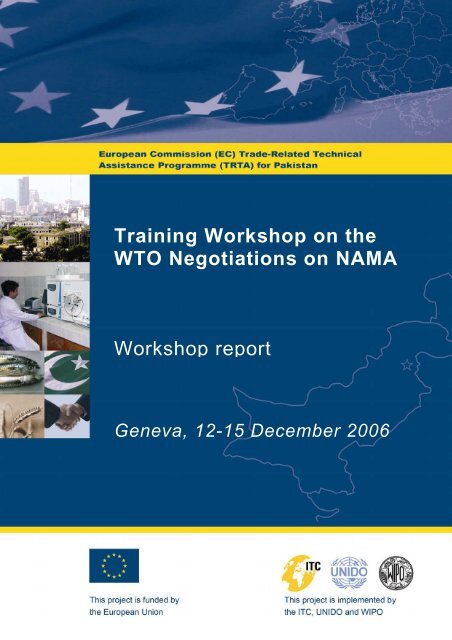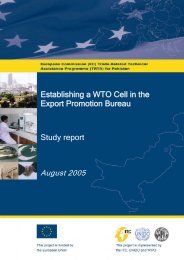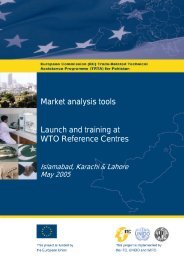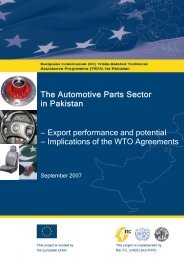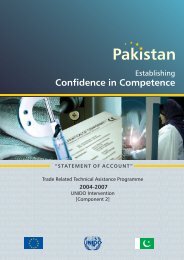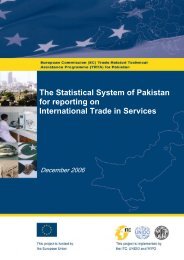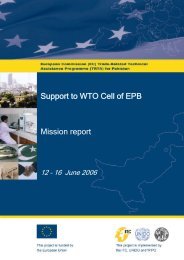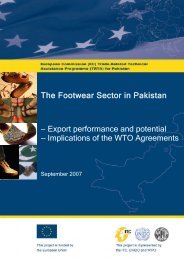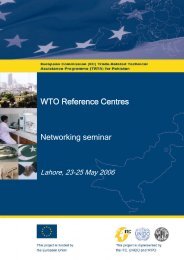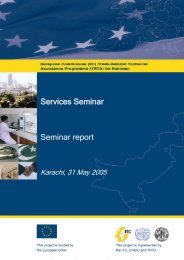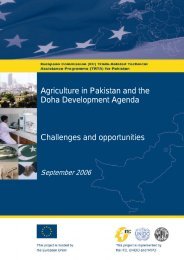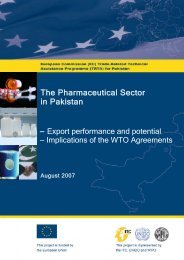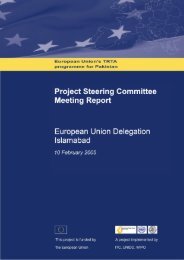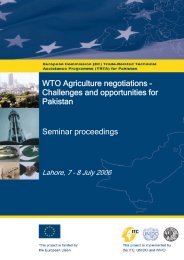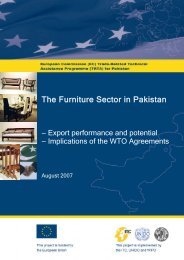Training Workshop on the WTO Negotiations on NAMA ... - TRTA i
Training Workshop on the WTO Negotiations on NAMA ... - TRTA i
Training Workshop on the WTO Negotiations on NAMA ... - TRTA i
You also want an ePaper? Increase the reach of your titles
YUMPU automatically turns print PDFs into web optimized ePapers that Google loves.
<str<strong>on</strong>g>Training</str<strong>on</strong>g> <str<strong>on</strong>g>Workshop</str<strong>on</strong>g> <strong>on</strong> <strong>the</strong><br />
<strong>WTO</strong> Negotiati<strong>on</strong>s <strong>on</strong> <strong>NAMA</strong><br />
<str<strong>on</strong>g>Workshop</str<strong>on</strong>g> report<br />
Geneva, 12-15 December 2006
This publicati<strong>on</strong> has been produced with <strong>the</strong> assistance of <strong>the</strong> European Commissi<strong>on</strong> (EC) as part of a<br />
EU-funded Trade Related Technical Assistance (<strong>TRTA</strong>) programme with <strong>the</strong> Government of Pakistan.<br />
The Internati<strong>on</strong>al Trade Centre (ITC) is implementing <strong>the</strong> programme. The c<strong>on</strong>tent of this publicati<strong>on</strong> is<br />
<strong>the</strong> sole resp<strong>on</strong>sibility of <strong>the</strong> c<strong>on</strong>sultant. Facts and figures set forth in this publicati<strong>on</strong> are <strong>the</strong><br />
resp<strong>on</strong>sibility of <strong>the</strong> c<strong>on</strong>sultant and should not be c<strong>on</strong>sidered as reflecting <strong>the</strong> views or carrying <strong>the</strong><br />
endorsement of <strong>the</strong> EC, ITC, UNCTAD, or <strong>WTO</strong>. The factual details and in-country resources in <strong>the</strong><br />
publicati<strong>on</strong> have been researched and compiled by <strong>the</strong> c<strong>on</strong>sultant. ITC has not formally edited this<br />
report.<br />
Written by:<br />
Dr Osvaldo R Agatiello<br />
C<strong>on</strong>sultant <strong>on</strong> <strong>the</strong> Multilateral Trading System<br />
© Internati<strong>on</strong>al Trade Centre (UNCTAD/<strong>WTO</strong>)<br />
Palais des Nati<strong>on</strong>s, 1211 Geneva 10, Switzerland<br />
Email: itcreg@intracen.org<br />
http://www.intracen.org<br />
Publicati<strong>on</strong> No. ITC/DTSS/<br />
Distributi<strong>on</strong>: UNRESTRICTED<br />
January 2007<br />
ITC: Your Partner in Trade Development<br />
The Internati<strong>on</strong>al Trade Centre is <strong>the</strong> technical cooperati<strong>on</strong> agency of <strong>the</strong> United Nati<strong>on</strong>s C<strong>on</strong>ference <strong>on</strong><br />
Trade and Development (UNCTAD) and <strong>the</strong> World Trade Organizati<strong>on</strong> (<strong>WTO</strong>) for operati<strong>on</strong>al and<br />
enterprise-oriented aspects of internati<strong>on</strong>al trade development. As <strong>the</strong> United Nati<strong>on</strong>s focal point for<br />
technical cooperati<strong>on</strong> in trade promoti<strong>on</strong>, ITC works with developing countries and ec<strong>on</strong>omies in<br />
transiti<strong>on</strong> to set up effective trade promoti<strong>on</strong> programmes to expand <strong>the</strong>ir exports and improve <strong>the</strong>ir<br />
import operati<strong>on</strong>s.<br />
ITC works in six areas:<br />
Product and market development<br />
Development of trade support services<br />
Trade informati<strong>on</strong><br />
Human resource development<br />
Internati<strong>on</strong>al purchasing and supply management<br />
Needs assessment, programme design for trade promoti<strong>on</strong>
EU Trade Related Technical Assistance Programme for Pakistan<br />
<str<strong>on</strong>g>Training</str<strong>on</strong>g> workshop <strong>on</strong> <strong>the</strong> <strong>WTO</strong> negotiati<strong>on</strong>s<br />
<strong>on</strong> n<strong>on</strong>-agricultural market access (<strong>NAMA</strong>)<br />
Geneva, 12-15 December 2006<br />
C<strong>on</strong>tents<br />
Abbreviati<strong>on</strong>s<br />
Introducti<strong>on</strong><br />
The training workshop<br />
The programme<br />
The c<strong>on</strong>text of <strong>the</strong> <strong>NAMA</strong> negotiati<strong>on</strong>s<br />
C<strong>on</strong>tent of <strong>the</strong> discussi<strong>on</strong>s<br />
Evaluati<strong>on</strong>s<br />
C<strong>on</strong>clusi<strong>on</strong>s<br />
Annex 1 - List of participants<br />
Annex 2 - Presentati<strong>on</strong>s<br />
Annex 3 - Resource pers<strong>on</strong>s<br />
Annex 4 - ITC Team<br />
Annex 5 - Evaluati<strong>on</strong> and feedback
Abbreviati<strong>on</strong>s<br />
DDA<br />
DDR<br />
EC<br />
EU<br />
FDI<br />
GATT<br />
GTAP<br />
ISO<br />
ITC<br />
NGTF<br />
NTB<br />
MTNs<br />
MTS<br />
<strong>NAMA</strong><br />
OECD<br />
PTAs<br />
S&D<br />
SME<br />
SPS<br />
TBT<br />
<strong>TRTA</strong>/CB<br />
UNCTAD<br />
UNIDO<br />
WIPO<br />
<strong>WTO</strong><br />
Doha Development Agenda<br />
Doha Development Round<br />
European Commissi<strong>on</strong><br />
European Uni<strong>on</strong><br />
foreign direct investment<br />
General Agreement <strong>on</strong> Tariffs and Trade<br />
Global Trade Analysis Project<br />
Internati<strong>on</strong>al Organizati<strong>on</strong> for Standardizati<strong>on</strong><br />
Internati<strong>on</strong>al Trade Centre UNCTAD/<strong>WTO</strong><br />
Negotiating Group <strong>on</strong> Trade Facilitati<strong>on</strong><br />
n<strong>on</strong>-tariff barrier<br />
multilateral trade negotiati<strong>on</strong>s<br />
multilateral trading system<br />
n<strong>on</strong>-agricultural market access<br />
Organizati<strong>on</strong> for Ec<strong>on</strong>omic Co-operati<strong>on</strong> and Development<br />
Preferential Trade Agreements<br />
special and differential treatment<br />
small and medium-sized enterprise<br />
sanitary and phytosanitary measure<br />
technical barriers to trade<br />
trade-related technical assistance and capacity building<br />
United Nati<strong>on</strong>s C<strong>on</strong>ference <strong>on</strong> Trade and Development<br />
United Nati<strong>on</strong>s Industrial Development Organizati<strong>on</strong><br />
World Intellectual Property Organizati<strong>on</strong><br />
World Trade Organizati<strong>on</strong>
Introducti<strong>on</strong><br />
A trade-related technical assistance project was initiated in <strong>the</strong> Islamic Republic of Pakistan<br />
in December 2006. The project is financed by <strong>the</strong> European Commissi<strong>on</strong>, with co-financing<br />
from ITC and UNIDO.<br />
The Project, for which ITC is <strong>the</strong> overall coordinating and executing agency, includes three<br />
comp<strong>on</strong>ents, as follows:<br />
• Comp<strong>on</strong>ent 1, led by ITC, focuses <strong>on</strong> creating awareness and building capacity in both<br />
<strong>the</strong> public and private sectors of Pakistan to fully benefit from <strong>the</strong> country’s<br />
participati<strong>on</strong> in <strong>the</strong> <strong>WTO</strong> Agreements;<br />
• Comp<strong>on</strong>ent 2, led by UNIDO, focuses <strong>on</strong> improving <strong>the</strong> quality, standards, metrology<br />
and accreditati<strong>on</strong> systems in <strong>the</strong> country; and,<br />
• Comp<strong>on</strong>ent 3, led by WIPO, focuses <strong>on</strong> intellectual property rights and <strong>the</strong>ir importance<br />
in promoting foreign direct investment (FDI).<br />
The overall objective of <strong>the</strong> project is to assist Pakistan in fostering its efficient integrati<strong>on</strong><br />
into <strong>the</strong> world ec<strong>on</strong>omy and, ultimately, to c<strong>on</strong>tribute to poverty alleviati<strong>on</strong> through <strong>the</strong><br />
achievement of trade-related c<strong>on</strong>diti<strong>on</strong>s for sustained and stable ec<strong>on</strong>omic growth and<br />
development. In <strong>the</strong> case of ITC, this objective is to be achieved by enhancing awareness<br />
am<strong>on</strong>g government officials, <strong>the</strong> business sector and civil society about <strong>the</strong> implicati<strong>on</strong>s of<br />
<strong>WTO</strong> Agreements <strong>on</strong> <strong>the</strong> Pakistani ec<strong>on</strong>omy, and to assist <strong>the</strong> country in building <strong>the</strong><br />
necessary capacities to address issues resulting from its participati<strong>on</strong> in <strong>the</strong> <strong>WTO</strong> multilateral<br />
trade negotiati<strong>on</strong>s (MTNs).<br />
The particular objective of <strong>the</strong> training workshop <strong>on</strong> n<strong>on</strong>-agricultural market access (<strong>NAMA</strong>)<br />
organized by ITC was to streng<strong>the</strong>n <strong>the</strong> capacity within relevant ministries and departments<br />
of <strong>the</strong> government of Pakistan to actively participate in <strong>the</strong> <strong>WTO</strong> negotiati<strong>on</strong>s <strong>on</strong> <strong>the</strong> matter<br />
and to foster awareness <strong>on</strong> <strong>the</strong> importance for <strong>the</strong> country of <strong>the</strong>ir successful c<strong>on</strong>clusi<strong>on</strong> as<br />
well as to advance expert preparati<strong>on</strong> for <strong>the</strong> alternative outcomes.
The <str<strong>on</strong>g>Training</str<strong>on</strong>g> <str<strong>on</strong>g>Workshop</str<strong>on</strong>g><br />
The training workshop <strong>on</strong> <strong>the</strong> <strong>WTO</strong> Negotiati<strong>on</strong>s <strong>on</strong> <strong>NAMA</strong> for high-level officers from<br />
Pakistan took place <strong>on</strong> 12-15 December 2006 at <strong>the</strong> <strong>WTO</strong> and ITC headquarters in Geneva.<br />
The training offered <strong>the</strong> opportunity to participants nominated by <strong>the</strong> Ministry of Commerce<br />
of Pakistan, counterpart to ITC for this project, to have a direct c<strong>on</strong>tact with some of <strong>the</strong><br />
main negotiators and experts in Geneva, and gain a better understanding of <strong>the</strong> negotiati<strong>on</strong><br />
process and <strong>the</strong> issues under discussi<strong>on</strong>. Also, <strong>the</strong> interventi<strong>on</strong> aimed at enhancing <strong>the</strong>ir<br />
capacity to support <strong>the</strong> work of <strong>the</strong> Permanent Missi<strong>on</strong> of Pakistan to <strong>the</strong> <strong>WTO</strong> in that area,<br />
and to more effectively c<strong>on</strong>tribute in defining Pakistan’s interests and negotiating positi<strong>on</strong>s<br />
<strong>on</strong> <strong>NAMA</strong> topics.<br />
Nine senior Pakistani government officials from <strong>the</strong> ministries of Commerce and Industries,<br />
Producti<strong>on</strong> and Special Initiatives as well as <strong>the</strong> Central Board of Revenue attended <strong>the</strong><br />
programme sessi<strong>on</strong>s, with <strong>the</strong> str<strong>on</strong>g support of <strong>the</strong> Pakistan Missi<strong>on</strong> to <strong>the</strong> <strong>WTO</strong> in Geneva.<br />
All of <strong>the</strong>m were experienced officials, current <strong>on</strong> <strong>the</strong> gist of <strong>the</strong> <strong>NAMA</strong> negotiati<strong>on</strong>s and <strong>the</strong><br />
stakes of Pakistan in <strong>the</strong>m. A list of <strong>the</strong> participants is included as Annex 1.<br />
The activities of <strong>the</strong> workshop took place at <strong>WTO</strong> and ITC headquarters, with <strong>the</strong><br />
participati<strong>on</strong> of top experts in <strong>NAMA</strong>, all based in Geneva. A list of <strong>the</strong> speakers is included<br />
in <strong>the</strong> Programme, while <strong>the</strong>ir full coordinates appear in Annex 3 below.<br />
The fact that <strong>the</strong> workshop took place c<strong>on</strong>currently with <strong>the</strong> resumpti<strong>on</strong> of <strong>the</strong> Doha<br />
Development Round (DDR) discussi<strong>on</strong>s (short of full negotiati<strong>on</strong>s, which were suspended in<br />
July 2006), gave <strong>the</strong> participants <strong>the</strong> opportunity to attend <strong>the</strong> last sessi<strong>on</strong> of <strong>the</strong> <strong>WTO</strong><br />
General Council organised <strong>on</strong> 14 December 2006.
The Programme<br />
<str<strong>on</strong>g>Training</str<strong>on</strong>g> workshop <strong>on</strong> <strong>the</strong> <strong>WTO</strong> negotiati<strong>on</strong>s<br />
<strong>on</strong> n<strong>on</strong>-agricultural market access (<strong>NAMA</strong>)<br />
Tuesday, 12 December 2006<br />
Geneva, 12-15 December 2006<br />
09h00 – 10h00<br />
<strong>WTO</strong> room A, RC<br />
10h00 – 10h30<br />
10h30 – 12h00<br />
12h00 – 14h00<br />
14h00 – 15h00<br />
ITC room 4-40<br />
15h00 – 15h30<br />
15h30 – 16h30<br />
16h30 – 17h30<br />
17h30 – 19h00<br />
ITC Cafeteria, RC<br />
Welcome and opening address<br />
Ms Patricia Francis, Executive Director, Internati<strong>on</strong>al Trade Centre<br />
H.E. Ambassador Manzoor Ahmad, Permanent Representative of Pakistan<br />
to <strong>the</strong> World Trade Organizati<strong>on</strong><br />
Mr. Eric Alvarez Gurza, Chief, Office for Asia-Pacific, Latin America and<br />
<strong>the</strong> Caribbean, Internati<strong>on</strong>al Trade Centre UNCTAD/<strong>WTO</strong><br />
Coffee / tea break<br />
N<strong>on</strong>-agricultural market access negotiati<strong>on</strong>s: state of play<br />
Mr Jean Pierre Lapalme, Counsellor, Market Access Divisi<strong>on</strong>, World<br />
Trade Organizati<strong>on</strong><br />
Lunch break<br />
Stance and strategy of Pakistan in <strong>NAMA</strong> negotiati<strong>on</strong>s<br />
Dr Mohammad Saeed, Counsellor, Permanent Missi<strong>on</strong> of Pakistan to <strong>the</strong><br />
World Trade Organizati<strong>on</strong><br />
Coffee / tea break<br />
Business advocacy in multilateral trade negotiati<strong>on</strong>s<br />
Mr Carlos Emilio Rosas, C<strong>on</strong>sultant, Multilateral Trading System,<br />
Divisi<strong>on</strong> of Trade Support Services, Internati<strong>on</strong>al Trade Centre<br />
Group discussi<strong>on</strong><br />
Cocktail party at ITC<br />
Wednesday, 13 December 2006<br />
09h30 – 10h30<br />
ITC room 4-40<br />
10h30 – 11h30<br />
General overview of <strong>NAMA</strong> modalities<br />
Mr Darlan F<strong>on</strong>seca-Martí, Programme Officer, Trade in Industrial Goods,<br />
South Centre<br />
Overview of <strong>the</strong> <strong>NAMA</strong> negotiati<strong>on</strong>s<br />
H.E. Ambassador D<strong>on</strong> Stephens<strong>on</strong>, Permanent Representative of Canada<br />
to <strong>the</strong> World Trade Organizati<strong>on</strong>, Chairman of <strong>the</strong> Negotiating Group <strong>on</strong><br />
Market Access
11h30 – 10h45<br />
11h45 – 13h00<br />
13h00 – 13h30<br />
13h30 – 14h30<br />
14h30 – 15h30<br />
15h30 – 16h30<br />
16h30 – 17h30<br />
Coffee / tea break<br />
Preference erosi<strong>on</strong> in <strong>NAMA</strong> and impact <strong>on</strong> market access c<strong>on</strong>diti<strong>on</strong>s<br />
using MacMap<br />
Mr Teddy Soobramanien, Senior Trade Policy Advisor, and Ms Helen<br />
Lassen, Market Analyst, Market Analysis Secti<strong>on</strong>, Divisi<strong>on</strong> of Product<br />
and Market Development, Internati<strong>on</strong>al Trade Centre<br />
Studies of five sectors in Pakistan<br />
Mr Morten Scholer, Senior Market Development Advisor, Market<br />
Development Secti<strong>on</strong>, Divisi<strong>on</strong> of Product and Market Development,<br />
Internati<strong>on</strong>al Trade Centre<br />
Lunch break<br />
General equilibrium and trade policy analysis<br />
Mr Marco Fugazza, Ec<strong>on</strong>omic Affairs Officer, Trade Analysis Branch,<br />
Divisi<strong>on</strong> <strong>on</strong> Internati<strong>on</strong>al Trade in Goods and Services and Commodities,<br />
United Nati<strong>on</strong>s C<strong>on</strong>ference <strong>on</strong> Trade and Development<br />
Trade in textiles and clothing: <strong>the</strong> view of <strong>the</strong> sector<br />
Mr Munir Ahmad, Executive Director, Internati<strong>on</strong>al Textile and Clothing<br />
Bureau<br />
The employment and development dimensi<strong>on</strong> of <strong>NAMA</strong> negotiati<strong>on</strong>s: a<br />
trade uni<strong>on</strong> view<br />
Ms Es<strong>the</strong>r Busser, Trade Policy Officer, Internati<strong>on</strong>al Trade Uni<strong>on</strong><br />
C<strong>on</strong>federati<strong>on</strong><br />
Thursday, 14 December 2006<br />
09h00 – 10h00<br />
ITC room 4-40<br />
10h00 – 10h30<br />
10h30 – 12h30<br />
12h00 – 14h00<br />
14h00 – 15h00<br />
15h00 – 15h30<br />
Trade in textiles and clothing in <strong>NAMA</strong> negotiati<strong>on</strong>s<br />
Mr Jean Pierre Lapalme, Counsellor, Market Access Divisi<strong>on</strong>, World<br />
Trade Organizati<strong>on</strong><br />
Coffee / tea break<br />
Visit to <strong>WTO</strong> General Council<br />
Lunch break<br />
Envir<strong>on</strong>mental goods negotiati<strong>on</strong>s, opportunities and challenges for<br />
developing countries<br />
Mr Mahesh Sugathan, Programme Coordinator, Ec<strong>on</strong>omics and Trade<br />
Policy Analysis, Internati<strong>on</strong>al Centre for Trade and Sustainable<br />
Development<br />
Coffee / tea break
15h30 – 16h30<br />
16h30 – 17h00<br />
17h00 – 17h30<br />
The <strong>WTO</strong> <strong>NAMA</strong> negotiati<strong>on</strong>s: challenges and opportunities<br />
Mr Sam Laird, Special Professor of Internati<strong>on</strong>al Ec<strong>on</strong>omics, University<br />
of Nottingham and Visiting Professor, World Trade Institute, Bern.<br />
Group discussi<strong>on</strong> and wrap up sessi<strong>on</strong><br />
Closing sessi<strong>on</strong> and distributi<strong>on</strong> of certificates<br />
Mr Stephen Browne, Deputy Executive Director, Internati<strong>on</strong>al Trade<br />
Centre<br />
Friday, 15 December 2006<br />
09h30 – 12h30<br />
Meeting at <strong>the</strong> Permanent Missi<strong>on</strong> of Pakistan
The C<strong>on</strong>text of <strong>the</strong> <strong>NAMA</strong> Negotiati<strong>on</strong>s<br />
The negotiati<strong>on</strong>s <strong>on</strong> n<strong>on</strong>-agricultural products, c<strong>on</strong>ducted within <strong>the</strong> <strong>WTO</strong> Market Access<br />
Negotiating Group, comprise all products not included in <strong>the</strong> Agreement <strong>on</strong> Agriculture. As<br />
such, <strong>the</strong>y include manufacturing products, fuels and mining products, fish and fish products,<br />
and forestry products. This universe of goods represents almost 90 percent of <strong>the</strong> world’s<br />
merchandise exports.<br />
According to <strong>the</strong> mandate c<strong>on</strong>tained in <strong>the</strong> DDA (Doha Development Agenda, Fourth<br />
Ministerial C<strong>on</strong>ference, Doha, Qatar, November 2001), <strong>the</strong> ministers agreed to launch tariffcutting<br />
negotiati<strong>on</strong>s <strong>on</strong> all n<strong>on</strong>-agricultural products. The aim is “to reduce, or as appropriate<br />
eliminate tariffs, including <strong>the</strong> reducti<strong>on</strong> or eliminati<strong>on</strong> of tariff peaks, high tariffs, and tariff<br />
escalati<strong>on</strong>, as well as n<strong>on</strong>-tariff barriers, in particular <strong>on</strong> products of export interest to<br />
developing countries”.<br />
Also, <strong>the</strong>se negotiati<strong>on</strong>s should specifically take into account <strong>the</strong> special needs and interests<br />
of developing countries, in particular least-developed <strong>on</strong>es, and recognize that <strong>the</strong>se countries<br />
do not need to match or reciprocate in full tariff-reducti<strong>on</strong> commitments by o<strong>the</strong>r<br />
participants. Depending <strong>on</strong> <strong>the</strong> eventual outcome of <strong>the</strong> Multilateral Trade Negotiati<strong>on</strong>s<br />
(MTNs), <strong>on</strong>e-time gains of between USD40 billi<strong>on</strong> and USD60 billi<strong>on</strong> are calculated, that is,<br />
<strong>the</strong> equivalent of about 0.2 percent of current global output. Am<strong>on</strong>g developing countries,<br />
like Pakistan, about 90 percent of <strong>the</strong> gains from any plausible Doha Development Round<br />
(DDR) scenario would result from liberalizati<strong>on</strong> of trade in manufactured goods. 1<br />
Average tariff reducti<strong>on</strong>s, largely resulting from Uruguay Round commitments, have<br />
trimmed down developing country tariffs to about <strong>on</strong>e third <strong>the</strong>ir level two decades ago,<br />
while some quantitative restricti<strong>on</strong>s, such as quotas and import licenses, have been reduced<br />
or eliminated altoge<strong>the</strong>r. Average developed country tariffs stand at about 3.8 percent.<br />
However, tariffs c<strong>on</strong>tinue to be a barrier to internati<strong>on</strong>al trade, including “tariff peaks”, those<br />
that are relatively high amidst generally low tariffs, and “tariff escalati<strong>on</strong>”, higher import<br />
duties applied <strong>on</strong> semi-processed and finished products. There is also <strong>the</strong> problem of “water”<br />
or “binding overhand” –that is, <strong>the</strong> difference between <strong>the</strong> “tariff binding”, or ceiling level a<br />
country has committed to, and <strong>the</strong> effectively “applied tariff”– because it affects <strong>the</strong><br />
predictability of trade transacti<strong>on</strong>s.<br />
The negotiati<strong>on</strong>s also comprise n<strong>on</strong>-tariff barriers (NTBs), that is, those measures o<strong>the</strong>r than<br />
tariffs which can be used to protect domestic industry. Some standards and technical<br />
regulati<strong>on</strong>s, like SPS and TBT, which mostly apply to <strong>the</strong> mitigati<strong>on</strong> of health and<br />
envir<strong>on</strong>mental risks or to prevent deceptive practices, by advancing benchmarks for quality,<br />
safety, au<strong>the</strong>nticity, good practices, sustainability, traceability, and <strong>the</strong> like, can at times be<br />
c<strong>on</strong>strued as undue restricti<strong>on</strong>s to trade. The <strong>NAMA</strong> negotiating group, <strong>the</strong> Negotiating<br />
Group <strong>on</strong> Trade Facilitati<strong>on</strong> (NGTF) and internati<strong>on</strong>al organizati<strong>on</strong>s, like UNCTAD, <strong>the</strong><br />
World Bank and OECD, have been categorizing and examining NTBs and many related<br />
1 http://www.wto.org/english/tratop_e/markacc_e/markacc_negoti_e.htm;<br />
http://www.wto.org/english/<strong>the</strong>wto_e/whatis_e/tif_e/doha1_e.htm;<br />
http://www.wto.org/english/tratop_e/markacc_e/nama_negotiati<strong>on</strong>s_e.htm; Sandra Polaski, Winners and losers:<br />
Impact of <strong>the</strong> Doha Round <strong>on</strong> Developing countries (Washingt<strong>on</strong>, DC: Carnegie Endowment for Internati<strong>on</strong>al<br />
Peace, March 2006), http://www.carnegieendowment.org/publicati<strong>on</strong>s/index.cfm?fa=view&id=18083.
differences have been resolved bilaterally and regi<strong>on</strong>ally. Some developing country<br />
governments have significantly advanced in identifying NTBs across sectors and importing<br />
countries, warning <strong>the</strong>ir exporters about <strong>the</strong>m, and promoting negotiated soluti<strong>on</strong>s for <strong>the</strong>ir<br />
eliminati<strong>on</strong>.<br />
The crux of <strong>the</strong> negotiati<strong>on</strong>s, although o<strong>the</strong>r important issues also stand out, revolves around<br />
(i) <strong>the</strong> formula and percentages that will be applied to tariff reducti<strong>on</strong>s in a manner that<br />
assures transparency, efficiency, equity and predictability, and (ii) <strong>the</strong> flexibilities that will<br />
apply to developing countries, like l<strong>on</strong>ger implementati<strong>on</strong> periods for <strong>the</strong>ir tariff reducti<strong>on</strong>s<br />
(against increasing <strong>the</strong>ir binding coverage), while LDCs will not be required to apply <strong>the</strong><br />
formula.<br />
It is important to note that about three quarters of all tariff barriers faced by developing<br />
countries arise from o<strong>the</strong>r developing countries and that <strong>the</strong> very applicati<strong>on</strong> of a tariffreducti<strong>on</strong><br />
formula will redound in a substantial reducti<strong>on</strong> or eliminati<strong>on</strong> of tariff peaks, high<br />
tariffs and tariff escalati<strong>on</strong>. This means that enhanced market access opportunities will result<br />
in developed and developing country markets alike and that this would be <strong>the</strong> most important<br />
outcome of <strong>the</strong> whole exercise.<br />
At <strong>the</strong> request of member countries, <strong>the</strong> <strong>WTO</strong> Secretariat prepared a number of technical<br />
studies <strong>on</strong> <strong>NAMA</strong>, including <strong>on</strong> tariff profiles, formula approaches to negotiati<strong>on</strong>s, and data<br />
availability and software tools for tariff negotiati<strong>on</strong>s. Also, member countries have submitted<br />
numerous proposals of <strong>the</strong>ir own, individually and as members of country groupings, like<br />
those of <strong>the</strong> <strong>NAMA</strong> 11 Group of Developing Countries (Argentina, Bolivarian Republic of<br />
Venezuela, Brazil, Egypt, India, Ind<strong>on</strong>esia, Namibia, Philippines, South Africa and Tunisia),<br />
<strong>the</strong> LDC Group, <strong>the</strong> ACP Group of States and <strong>the</strong> APEC Member Ec<strong>on</strong>omies. Of particular<br />
interest are TN/MA/W/65 of 8 November 2005 <strong>on</strong> flexibilities for developing countries,<br />
submitted by eleven countries, including Pakistan, and TN/MA/W/60 of 20 July 2005,<br />
submitted by Pakistan and c<strong>on</strong>taining ideas for bridging <strong>the</strong> gap between <strong>the</strong> current<br />
proposals relating to <strong>the</strong> key issues of tariff reducti<strong>on</strong> formulae and treatment of unbound<br />
tariffs. The complete set of documents can be found at<br />
http://www.wto.org/english/tratop_e/markacc_e/markacc_negoti_e.htm#docs,<br />
http://www.wto.org/english/tratop_e/markacc_e/.
C<strong>on</strong>tent of <strong>the</strong> discussi<strong>on</strong>s<br />
ITC Executive Director Patricia Francis inaugurated <strong>the</strong> programme by pointing out at <strong>the</strong><br />
special relati<strong>on</strong>ship between ITC and <strong>the</strong> government of Pakistan, and <strong>the</strong> importance of such<br />
specialised training sessi<strong>on</strong>s to streng<strong>the</strong>n <strong>the</strong> capacity of partner countries. Amb. Ahmad<br />
remarked <strong>the</strong> importance of <strong>the</strong> <strong>NAMA</strong> negotiati<strong>on</strong>s, which are at <strong>the</strong> core of <strong>the</strong> DDR<br />
negotiati<strong>on</strong>s, toge<strong>the</strong>r with agricultural goods and services, and referred to <strong>the</strong> recent trade<br />
policy workshop held in Pakistan and <strong>the</strong> training workshop <strong>on</strong> trade facilitati<strong>on</strong> for senior<br />
Pakistani officials held in Geneva in July 2006. Mr Eric Alvarez Gurza, Chief of ITC’s<br />
Office for Asia-Pacific, Latin America and <strong>the</strong> Caribbean and overall resp<strong>on</strong>sible for <strong>the</strong><br />
organizati<strong>on</strong> of <strong>the</strong> training workshop, explained <strong>the</strong> logistics of <strong>the</strong> meeting and <strong>the</strong> results<br />
expected from it.<br />
There were 15 topical interventi<strong>on</strong>s at <strong>the</strong> workshop, including (i) those directly related to<br />
progress in <strong>the</strong> <strong>NAMA</strong> negotiati<strong>on</strong>s within <strong>the</strong> <strong>WTO</strong> framework, (ii) those related to<br />
technical support tools, (iii) those related to <strong>NAMA</strong> as a development topic that reaches<br />
bey<strong>on</strong>d <strong>the</strong> negotiati<strong>on</strong> agenda and touches up<strong>on</strong> diverse aspects of Pakistan’s domestic<br />
policymaking, and (iv) those relating to <strong>the</strong> political aspects involved. Copies of <strong>the</strong><br />
presentati<strong>on</strong>s detailed in Annex 2 as well as o<strong>the</strong>r materials <strong>on</strong> <strong>NAMA</strong> were delivered to <strong>the</strong><br />
participants in CD-ROM format. Both hard and soft copies are fur<strong>the</strong>r available for<br />
distributi<strong>on</strong> up<strong>on</strong> request to ITC team members (refer to Annex 4 below).<br />
The representative of <strong>the</strong> <strong>WTO</strong> Market Access Divisi<strong>on</strong> gave an overview of <strong>the</strong> issues under<br />
discussi<strong>on</strong>, <strong>the</strong> c<strong>on</strong>cepts applied and <strong>the</strong> stakes at play, which were reinforced in his later<br />
presentati<strong>on</strong> <strong>on</strong> <strong>the</strong> textile industry, of critical importance to Pakistan. The Counsellor of <strong>the</strong><br />
Permanent Missi<strong>on</strong> of Pakistan to <strong>the</strong> <strong>WTO</strong> in turn made a comprehensive presentati<strong>on</strong> <strong>on</strong><br />
<strong>NAMA</strong> as an issue under negotiati<strong>on</strong> and answered numerous questi<strong>on</strong>s of <strong>the</strong> participants.<br />
Some of <strong>the</strong> questi<strong>on</strong>s went to <strong>the</strong> core of <strong>the</strong> subject matter, like “Should Pakistan diversify<br />
away from <strong>the</strong> textile industry?” or “Should Pakistan follow <strong>the</strong> pattern of o<strong>the</strong>r developing<br />
countries of pursuing <strong>the</strong> multilateral path but at <strong>the</strong> same time c<strong>on</strong>clude FTAs with <strong>the</strong><br />
United States and <strong>the</strong> European Uni<strong>on</strong>?”<br />
The Chairman of <strong>the</strong> Negotiating Group <strong>on</strong> <strong>NAMA</strong>, Amb. Stephens<strong>on</strong> of Canada, introduced<br />
<strong>the</strong> political perspective of <strong>the</strong> discussi<strong>on</strong>s. Indeed, this means understanding <strong>the</strong> difference<br />
between satisfying political aims from commercial aims, those that address real ec<strong>on</strong>omic<br />
interests. For instance, <strong>the</strong> discussi<strong>on</strong> <strong>on</strong> preferences involves three aspects, namely<br />
preference erosi<strong>on</strong> for some; <strong>the</strong> impact of preferences in favour of competitors (textiles and<br />
clothing, fish and fish products) <strong>on</strong> <strong>the</strong> domestic ec<strong>on</strong>omy of third countries; and <strong>the</strong> offers of<br />
new preferences. Some sort of balance should be reached case by case to attain overall<br />
results.<br />
The participants were very interested in <strong>the</strong> operati<strong>on</strong> of Market Access Map (MacMap,<br />
http://www.macmap.org/), <strong>the</strong> facility designed by ITC to support exporters, importers, trade<br />
promoters, policy analysts and trade negotiators to prepare for trade negotiati<strong>on</strong>s by<br />
simulating <strong>the</strong> effects of tariff reducti<strong>on</strong>s. It includes <strong>the</strong> import duties and o<strong>the</strong>r measures<br />
applied by 178 importing countries to products from 239 countries and territories, showing<br />
MFN and preferential rates for products at <strong>the</strong> most detailed nati<strong>on</strong>al tariff line level. O<strong>the</strong>r<br />
presentati<strong>on</strong>s by UNCTAD expert Marco Fugazza and Prof. Sam Laird, who specialize in<br />
general equilibrium and trade policy analysis helped go deeper into <strong>the</strong> subject.
Finally, <strong>the</strong> participati<strong>on</strong> of top experts <strong>on</strong> textiles and clothing, envir<strong>on</strong>mental goods and<br />
employment and <strong>the</strong> development dimensi<strong>on</strong> gave a broader reach to <strong>the</strong> programme,<br />
c<strong>on</strong>sidering <strong>the</strong> significant investments developing countries have to make to keep up with<br />
ever-more-ambitious, generally-accepted performance standards. This is particularly<br />
important because some trade models do not capture <strong>the</strong> adjustment costs demanded by trade<br />
reform and <strong>the</strong>ir negative, sometimes permanent, impact <strong>on</strong> individuals, households,<br />
countries and regi<strong>on</strong>s.
Evaluati<strong>on</strong>s<br />
The participants’ assessment of <strong>the</strong> usefulness and opportunity of <strong>the</strong> workshop, as expressed<br />
in <strong>the</strong>ir evaluati<strong>on</strong> forms and numerous oral interventi<strong>on</strong>s, was overwhelmingly positive.<br />
Annex 5 provides a sample of <strong>the</strong> evaluati<strong>on</strong> form distributed am<strong>on</strong>g participants and a<br />
summary of <strong>the</strong>ir evaluati<strong>on</strong>s.<br />
Am<strong>on</strong>g <strong>the</strong> assessments and recommendati<strong>on</strong>s c<strong>on</strong>tained in <strong>the</strong> evaluati<strong>on</strong> forms were:<br />
• The presentati<strong>on</strong>s provided]“c<strong>on</strong>ceptual clarity and understanding of <strong>NAMA</strong><br />
issues … [and] of Pakistan’s and o<strong>the</strong>r competitors’ positi<strong>on</strong>s; will help my work<br />
directly”.<br />
• “Exchange of informati<strong>on</strong> between participants and ITC organizers is very<br />
essential prior to travel from Pakistan”.<br />
• “It will be useful to propose policies (regarding industries) which will be in line<br />
with <strong>the</strong> <strong>NAMA</strong> negotiati<strong>on</strong>s.”<br />
• Participants should “be provided an outline of <strong>the</strong> courses/subjects so that <strong>the</strong>y<br />
can have a proper understanding of <strong>the</strong> subjects at <strong>the</strong> time of <strong>the</strong> presentati<strong>on</strong>s”.<br />
• “More informati<strong>on</strong> and encouragement to use MacMap; more understanding of<br />
preference erosi<strong>on</strong> and envir<strong>on</strong>mental goods; more exchange of ideas are<br />
required”.<br />
• “As <strong>the</strong> <strong>NAMA</strong> negotiati<strong>on</strong>s head towards a possible resumpti<strong>on</strong> and agreement<br />
(hopefully) <strong>the</strong> participants may be kept informed [by ITC] about <strong>the</strong> latest<br />
developments through e-mail.”<br />
The recommendati<strong>on</strong>s and o<strong>the</strong>r comments of <strong>the</strong> participants showed <strong>the</strong>ir deep interest in<br />
<strong>the</strong> programme and its subject matter. The success of targeted follow-up acti<strong>on</strong> to maintain<br />
interest in <strong>NAMA</strong> and o<strong>the</strong>r issues affecting market access, is thus assured in future<br />
programmes.
C<strong>on</strong>clusi<strong>on</strong>s<br />
Numerous ideas came up as a result of <strong>the</strong> training workshop. They included <strong>the</strong> following:<br />
• The <strong>NAMA</strong> negotiati<strong>on</strong>s are complex and closely intertwined with o<strong>the</strong>r negotiati<strong>on</strong><br />
topics, especially those <strong>on</strong> agricultural products and services;<br />
• Any final agreement in this area will be a compromise between <strong>the</strong> various issues under<br />
negotiati<strong>on</strong> as well as <strong>the</strong> extent of S&D treatment and <strong>the</strong> availability of <strong>TRTA</strong>/CB in<br />
favour of developing countries to eventually resp<strong>on</strong>d to <strong>the</strong> new commitments;<br />
• Final agreement will impact <strong>on</strong> developed and developing ec<strong>on</strong>omies differently and <strong>the</strong><br />
resulting adjustments will determine a large segment of <strong>the</strong> industrial policies of<br />
Pakistan, and all member countries, for years to come;<br />
• An alternative scenario is no DDR agreement in <strong>the</strong> foreseeable future and <strong>the</strong><br />
proliferati<strong>on</strong> of preferential trade agreements (PTAs) or some new combinati<strong>on</strong> of<br />
multilateralism and regi<strong>on</strong>alism.<br />
The training workshop built <strong>on</strong> <strong>the</strong> valuable experience ga<strong>the</strong>red through a similar exercise<br />
<strong>on</strong> trade facilitati<strong>on</strong> that took place in July 2006. Both can serve as models for future ITC<br />
interventi<strong>on</strong>s <strong>on</strong> MTN topics.<br />
In what specifically c<strong>on</strong>cerns <strong>the</strong> <strong>NAMA</strong> negotiati<strong>on</strong>s, pivotal as <strong>the</strong>y are to a successful<br />
outcome of <strong>the</strong> current round of negotiati<strong>on</strong>s, <strong>the</strong>y will c<strong>on</strong>tinue to command <strong>the</strong> attenti<strong>on</strong> of<br />
traders, governments and internati<strong>on</strong>al organizati<strong>on</strong>s. Likewise, <strong>the</strong> macroec<strong>on</strong>omic<br />
decisi<strong>on</strong>s that Pakistan has to make in preparati<strong>on</strong> and as a c<strong>on</strong>sequence of n<strong>on</strong>-agricultural<br />
product liberalizati<strong>on</strong>, will impact <strong>on</strong> several generati<strong>on</strong>s of Pakistanis. It is through <strong>the</strong><br />
informed exchange of ideas and exhaustive discussi<strong>on</strong> with experts that <strong>the</strong>se decisi<strong>on</strong>s can<br />
best be made and implemented.<br />
By fostering <strong>the</strong> study and discussi<strong>on</strong> of <strong>the</strong> main topics relating to <strong>the</strong> <strong>NAMA</strong> and o<strong>the</strong>r key<br />
negotiati<strong>on</strong>s under <strong>the</strong> <strong>WTO</strong> aegis, ITC helps Pakistani government officials better discharge<br />
<strong>the</strong>ir resp<strong>on</strong>sibilities, while fulfilling its own mandate for awareness creati<strong>on</strong> and capacity<br />
building in internati<strong>on</strong>al trade.
Annex 1<br />
List of Participants<br />
Mrs. Yasmin Masood<br />
Deputy Secretary, <strong>WTO</strong> Wing<br />
Ministry of Commerce, Government of Pakistan<br />
Mr. Muhammad Irfan<br />
Secti<strong>on</strong> Officer, <strong>WTO</strong> Wing<br />
Ministry of Commerce, Government of Pakistan<br />
Mr. Malik Muhammad Afzal<br />
Secti<strong>on</strong> Officer, Foreign Trade Wing<br />
Ministry of Commerce, Government of Pakistan<br />
Mr. Mansoor Ahmed Bajwa<br />
Deputy Secretary, Foreign Trade Wing<br />
Ministry of Commerce, Government of Pakistan<br />
Mr. Muhammad Owais Khan<br />
Secti<strong>on</strong> Officer, Foreign Trade Wing<br />
Ministry of Commerce, Government of Pakistan<br />
Mr. Ahmed Irfan Aslam<br />
Legal C<strong>on</strong>sultant, <strong>WTO</strong> Wing<br />
Ministry of Commerce, Government of Pakistan<br />
Mr. Nasir Masroor Ahmed<br />
Chief, Tariffs and Trade<br />
Central Board of Revenue, Islamabad<br />
Mr. Nazar Abbas<br />
Secti<strong>on</strong> Officer<br />
Ministry of Industries, Producti<strong>on</strong> and Special Initiatives, Government of Pakistan<br />
Mr. Attaullah Khattak<br />
Assistant Chief (Investments)<br />
Ministry of Industries, Producti<strong>on</strong> and Special Initiatives, Government of Pakistan
Annex 2<br />
Presentati<strong>on</strong>s<br />
N<strong>on</strong>-agricultural market access negotiati<strong>on</strong>s: state of play<br />
MR JEAN PIERRE LAPALME<br />
Stance and strategy of Pakistan in <strong>NAMA</strong> negotiati<strong>on</strong>s<br />
Dr Mohammad Saeed<br />
Business advocacy in multilateral trade negotiati<strong>on</strong>s<br />
Mr. Carlos Rosas<br />
General overview of <strong>NAMA</strong> modalities<br />
Mr Darlan F<strong>on</strong>seca-Martí<br />
Preference erosi<strong>on</strong> in <strong>NAMA</strong> and impact <strong>on</strong> market access c<strong>on</strong>diti<strong>on</strong>s using MacMap<br />
Mr Teddy Soobramanien and Ms Helen Lassen<br />
Studies of five sectors in Pakistan<br />
Mr Morten Scholer<br />
General equilibrium and trade policy analysis<br />
Mr Marco Fugazza<br />
Trade in textiles and clothing: <strong>the</strong> view of <strong>the</strong> sector<br />
Mr Munir Ahmad<br />
The employment and development dimensi<strong>on</strong> of <strong>NAMA</strong> negotiati<strong>on</strong>s: a trade uni<strong>on</strong> view<br />
Ms Es<strong>the</strong>r Busser<br />
Trade in textiles and clothing in <strong>NAMA</strong> negotiati<strong>on</strong>s<br />
Mr Jean Pierre Lapalme<br />
Envir<strong>on</strong>mental goods negotiati<strong>on</strong>s, opportunities and challenges for developing<br />
countries<br />
Mr Mahesh Sugathan<br />
The <strong>WTO</strong> <strong>NAMA</strong> negotiati<strong>on</strong>s: challenges and opportunities<br />
Mr Sam Laird
Annex 3<br />
Resource pers<strong>on</strong>s<br />
Ms Patricia Francis<br />
Executive Director, Internati<strong>on</strong>al Trade Centre<br />
H E Ambassador Dr Manzoor Ahmad<br />
Permanent Representative of Pakistan to <strong>the</strong> World<br />
Trade Organizati<strong>on</strong><br />
Mr Jean Pierre Lapalme<br />
Counsellor, Market Access Divisi<strong>on</strong>, World Trade<br />
Organizati<strong>on</strong><br />
Dr Mohammad Saeed<br />
Counsellor, Permanent Missi<strong>on</strong> of Pakistan to <strong>the</strong><br />
World Trade Organizati<strong>on</strong><br />
Mr Carlos Emilio Rosas<br />
C<strong>on</strong>sultant, Multilateral Trading System, Divisi<strong>on</strong><br />
of Trade Support Services, Internati<strong>on</strong>al Trade<br />
Centre<br />
Mr Darlan F<strong>on</strong>seca-Martí<br />
Programme Officer, Trade in Industrial Goods,<br />
South Centre<br />
H E Ambassador D<strong>on</strong> Stephens<strong>on</strong><br />
Permanent Representative of Canada to <strong>the</strong> World<br />
Trade Organizati<strong>on</strong>, Chairman of <strong>the</strong> Negotiating<br />
Group <strong>on</strong> Market Access<br />
Mr Teddy Soobramanien<br />
Senior Trade Policy Advisor, Market Analyst,<br />
Market Analysis Secti<strong>on</strong>, Divisi<strong>on</strong> of Product and<br />
Market Development, Internati<strong>on</strong>al Trade Centre<br />
Ms Helen Lassen<br />
Market Analyst, Market Analysis Secti<strong>on</strong>, Divisi<strong>on</strong><br />
of Product and Market Development, Internati<strong>on</strong>al<br />
Trade Centre<br />
Mr Morten Scholer<br />
Senior Market Development Advisor, Market<br />
Development Secti<strong>on</strong>, Divisi<strong>on</strong> of Product and<br />
Market Development, Internati<strong>on</strong>al Trade Centre<br />
francis@intracen.org<br />
info@wto-pakistan.org<br />
jean-pierre.lapalme@wto.org<br />
rosas@intracen.org<br />
f<strong>on</strong>seca@southcentre.org<br />
mohammad.saeed@wtopakistan.org<br />
jacin<strong>the</strong>.cotefortin@internati<strong>on</strong>al.gc.ca<br />
soobramanien@intracen.org<br />
lassen@intracen.org<br />
scholer@intracen.org
Mr Marco Fugazza<br />
Ec<strong>on</strong>omic Affairs Officer, Trade Analysis Branch,<br />
Divisi<strong>on</strong> <strong>on</strong> Internati<strong>on</strong>al Trade in Goods and<br />
Services and Commodities, United Nati<strong>on</strong>s<br />
C<strong>on</strong>ference <strong>on</strong> Trade and Development<br />
Mr Munir Ahmad<br />
Executive Director, Internati<strong>on</strong>al Textile and<br />
Clothing Bureau<br />
Ms Es<strong>the</strong>r Busser<br />
Trade Policy Officer, Internati<strong>on</strong>al Trade Uni<strong>on</strong><br />
C<strong>on</strong>federati<strong>on</strong><br />
Mr Mahesh Sugathan<br />
Programme Coordinator, Ec<strong>on</strong>omics and Trade<br />
Policy Analysis, Internati<strong>on</strong>al Centre for Trade and<br />
Sustainable Development<br />
Mr Sam Laird<br />
Special Professor of Internati<strong>on</strong>al Ec<strong>on</strong>omics,<br />
University of Nottingham and Visiting Professor,<br />
World Trade Institute, Bern<br />
Mr Stephen Browne<br />
Deputy Executive Director, Internati<strong>on</strong>al Trade<br />
Centre<br />
Dr Osvaldo R Agatiello<br />
C<strong>on</strong>sultant <strong>on</strong> <strong>the</strong> Multilateral Trading System,<br />
Internati<strong>on</strong>al Trade Centre<br />
marco.fugazza@unctad.org<br />
itcb@bluewin.ch<br />
es<strong>the</strong>r.busser@geneva.icftu.org<br />
smahesh@ictsd.ch<br />
sam_laird2000@yahoo.com<br />
browne@intracen.org<br />
osvaldo.agatiello@hotmail.com
Annex 4<br />
ITC Team<br />
Mr Eric Alvarez Gurza<br />
Chief, Office for Asia-Pacific, Latin America<br />
and <strong>the</strong> Caribbean, Internati<strong>on</strong>al Trade Centre<br />
alvarez@intracen.org<br />
Ms Lilia Naas Hachem<br />
Office for Asia-Pacific, Latin America and<br />
<strong>the</strong> Caribbean, Internati<strong>on</strong>al Trade Centre<br />
naas@intracen.org<br />
Mr Sadiq Syed<br />
Office for Asia-Pacific, Latin America and<br />
<strong>the</strong> Caribbean, Internati<strong>on</strong>al Trade Centre<br />
syed@intracen.org
Annex 5<br />
Evaluati<strong>on</strong> and feedback<br />
The following evaluati<strong>on</strong> form was distributed am<strong>on</strong>g <strong>the</strong> participants:<br />
<str<strong>on</strong>g>Training</str<strong>on</strong>g> workshop <strong>on</strong> <strong>the</strong> <strong>WTO</strong> negotiati<strong>on</strong>s <strong>on</strong> <strong>NAMA</strong><br />
Geneva, 12-15 December 2006<br />
Evaluati<strong>on</strong> and Feedback<br />
In our <strong>on</strong>-going effort to improve <strong>the</strong> quality and impact of our activities, we would like to request<br />
your feedback <strong>on</strong> <strong>the</strong> workshop you have attended. Please take a few minutes to answer <strong>the</strong> following<br />
questi<strong>on</strong>s.<br />
Thank you very much in advance<br />
Please circle <strong>the</strong> following questi<strong>on</strong>s from 1 (very negative) to 5 (very positive).<br />
1. How useful did you find <strong>the</strong> presentati<strong>on</strong>s?<br />
PRESENTATIONS: 1-------------2-------------3-------------4-------<br />
-------5<br />
NOT VERY<br />
VERY<br />
2. D<br />
USEFUL<br />
USEFUL<br />
i<br />
d <strong>the</strong> presenter(s) effectively c<strong>on</strong>vey <strong>the</strong> informati<strong>on</strong> you expected? In o<strong>the</strong>r words, were <strong>the</strong><br />
subjects clearly presented?<br />
3. Which of <strong>the</strong> presentati<strong>on</strong>s were specifically useful for your work?
4. Overall, was <strong>the</strong> workshop beneficial and a good use of your time?<br />
5<br />
1-------------2-------------3-------------4-------<br />
------5<br />
NOT<br />
VERY<br />
BENEFICIAL<br />
BENEFICIAL<br />
W<br />
WASTE OF<br />
h<br />
TIME<br />
at<br />
did you find particularly useful from <strong>the</strong> presentati<strong>on</strong>s and how will you apply it to your work<br />
<strong>on</strong>ce back in your country?<br />
6 What did you find particularly less useful from <strong>the</strong> presentati<strong>on</strong>s? What type of follow up would<br />
be useful to help reinforce <strong>the</strong> informati<strong>on</strong> you have received during <strong>the</strong> workshop? (Feel free to<br />
use <strong>the</strong> back of this paper to c<strong>on</strong>tinue)<br />
7 How could this training be improved? Please provide us with any additi<strong>on</strong>al comments that would<br />
allow us improve future workshops (Feel free to use <strong>the</strong> back of this paper to c<strong>on</strong>tinue)
INDIVIDUAL<br />
PRESENTATIONS<br />
1-------------2-------------3-------------4-------------5<br />
NOT HELPFUL<br />
AT ALL<br />
HELPFUL<br />
VERY<br />
NON-AGRICULTURAL MARKET ACCESS<br />
NEGOTIATIONS: STATE OF PLAY - MR JEAN<br />
PIERRE LAPALME<br />
Stance and strategy of Pakistan in <strong>NAMA</strong> negotiati<strong>on</strong>s -<br />
Dr Mohammad Saeed<br />
1-----------2-----------3-----------4---<br />
--------5<br />
1-----------2-----------3-----------4---<br />
--------5<br />
Business advocacy in multilateral trade negotiati<strong>on</strong>s -<br />
Mr. Carlos Rosas<br />
General overview of <strong>NAMA</strong> modalities - Mr Darlan<br />
F<strong>on</strong>seca-Martí<br />
Overview of <strong>the</strong> <strong>NAMA</strong> negotiati<strong>on</strong>s - Amb. D<strong>on</strong><br />
Stephens<strong>on</strong><br />
Preference erosi<strong>on</strong> in <strong>NAMA</strong> and impact <strong>on</strong> market<br />
access c<strong>on</strong>diti<strong>on</strong>s using MacMap - Mr Teddy<br />
Soobramanien, Senior Trade Policy Advisor, and<br />
Ms Helen Lassen<br />
1-----------2-----------3-----------4-----------5<br />
1-----------2-----------3-----------4-----------5<br />
1-----------2-----------3-----------4-----------5<br />
1-----------2-----------3-----------4-----------5<br />
Studies of five sectors in Pakistan - Mr Morten Scholer 1-----------2-----------3-----------4-----------5<br />
General equilibrium and trade policy analysis - Mr<br />
Marco Fugazza<br />
Trade in textiles and clothing: <strong>the</strong> view of <strong>the</strong> sector<br />
Mr Munir Ahmad<br />
The employment and development dimensi<strong>on</strong> of<br />
<strong>NAMA</strong> negotiati<strong>on</strong>s: a trade uni<strong>on</strong> view - Ms Es<strong>the</strong>r<br />
Busser<br />
Trade in textiles and clothing in <strong>NAMA</strong> negotiati<strong>on</strong>s -<br />
Mr Jean Pierre Lapalme<br />
1-----------2-----------3-----------4-----------5<br />
1-----------2-----------3-----------4-----------5<br />
1-----------2-----------3-----------4-----------5<br />
1-----------2-----------3-----------4-----------5<br />
Visit to <strong>WTO</strong> General Council 1-----------2-----------3-----------4-----------5<br />
Envir<strong>on</strong>mental goods negotiati<strong>on</strong>s, opportunities and<br />
challenges for developing countries - Mr Mahesh<br />
Sugathan<br />
The <strong>WTO</strong> <strong>NAMA</strong> negotiati<strong>on</strong>s: challenges and<br />
opportunities - Mr Sam Laird<br />
1-----------2-----------3-----------4-----------5<br />
1-----------2-----------3-----------4-----------5
THANKS VERY MUCH!<br />
Some of <strong>the</strong> comments received are included in <strong>the</strong> Evaluati<strong>on</strong> secti<strong>on</strong> above. Overall, <strong>the</strong><br />
workshop was deemed very beneficial (questi<strong>on</strong> 1, 4.67, with a maximum of 5) and <strong>the</strong><br />
presentati<strong>on</strong>s very helpful (questi<strong>on</strong> 4, 4.67). The individual presentati<strong>on</strong>s and activities<br />
received <strong>the</strong> following weighted resp<strong>on</strong>ses from <strong>the</strong> participants:
NON-AGRICULTURAL MARKET ACCESS NEGOTIATIONS: STATE OF PLAY - MR<br />
JEAN PIERRE LAPALME<br />
4.56<br />
Stance and strategy of Pakistan in <strong>NAMA</strong> negotiati<strong>on</strong>s - Dr Mohammad Saeed 4.89<br />
Business advocacy in multilateral trade negotiati<strong>on</strong>s - Mr. Carlos Rosas 3.56<br />
General overview of <strong>NAMA</strong> modalities - Mr Darlan F<strong>on</strong>seca-Martí 4.67<br />
Overview of <strong>the</strong> <strong>NAMA</strong> negotiati<strong>on</strong>s - Amb. D<strong>on</strong> Stephens<strong>on</strong> 4.67<br />
Preference erosi<strong>on</strong> in <strong>NAMA</strong> and impact <strong>on</strong> market access c<strong>on</strong>diti<strong>on</strong>s using MacMap - Mr Teddy<br />
Soobramanienand Ms Helen Lassen<br />
3.75<br />
Studies of five sectors in Pakistan - Mr Morten Scholer 3.00<br />
General equilibrium and trade policy analysis - Mr Marco Fugazza 3.56<br />
Trade in textiles and clothing: <strong>the</strong> view of <strong>the</strong> sector<br />
Mr Munir Ahmad<br />
The employment and development dimensi<strong>on</strong> of <strong>NAMA</strong> negotiati<strong>on</strong>s: a trade uni<strong>on</strong> view - Ms<br />
Es<strong>the</strong>r Busser<br />
3.67<br />
4.00<br />
Trade in textiles and clothing in <strong>NAMA</strong> negotiati<strong>on</strong>s - Mr Jean Pierre Lapalme 4.45<br />
Visit to <strong>WTO</strong> General Council 4.67<br />
Envir<strong>on</strong>mental goods negotiati<strong>on</strong>s, opportunities and challenges for developing countries - Mr<br />
Mahesh Sugathan<br />
3.34<br />
The <strong>WTO</strong> <strong>NAMA</strong> negotiati<strong>on</strong>s: challenges and opportunities - Mr Sam Laird 4.45<br />
<str<strong>on</strong>g>Training</str<strong>on</strong>g> <str<strong>on</strong>g>Workshop</str<strong>on</strong>g> <strong>on</strong> <strong>the</strong><br />
<strong>WTO</strong> Negotiati<strong>on</strong>s <strong>on</strong> <strong>NAMA</strong>


